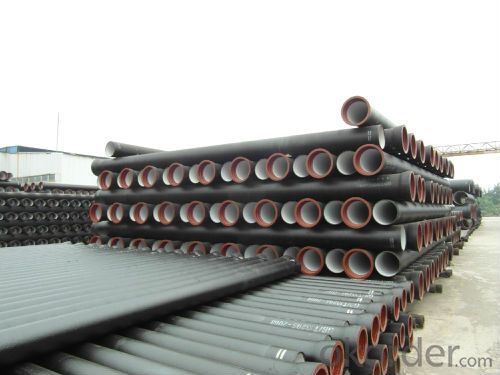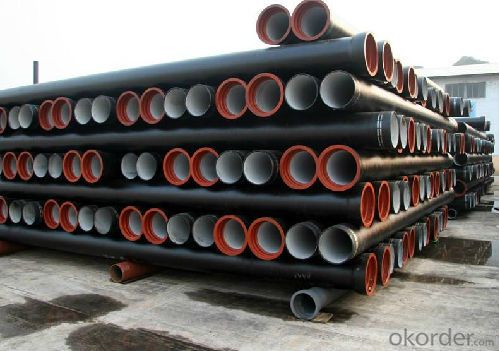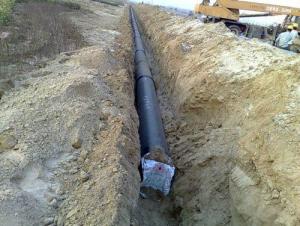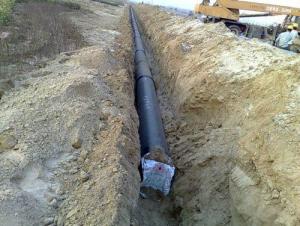Ductile Iron Pipe EN545/EN598/ISO2531 Potable Water
- Loading Port:
- China main port
- Payment Terms:
- TT or LC
- Min Order Qty:
- 10000 m.t.
- Supply Capability:
- 200000 m.t./month
OKorder Service Pledge
OKorder Financial Service
You Might Also Like
1.Ductile Iron Pipe Description :
1) Pipes confirm to ISO2531,K9 class,T type joint,6m long,with inside cements lining conform to ISO4179,outside Zinc
spraying(130g/m2) and bitumen coating(70μm) conform to ISO8179.
2) Pipe ends: Spigot and socket ends, with 100% SBR rubber gaskets accoding to ISO4633
3) we can do third party inspection according to customer's request.
4) Our products have been sold to many international market, such as Middle East and South East Asia and Africa.
2.Main Features of the Ductile Iron Pipe:
1. Material: Ductile iron grade 500-7/ 450-10 in accordance with ISO1083
2. Standard: ISO 2531, EN545, EN598, ANSI, AWWA
3. Certificate: ISO9001, ISO14001, SGS, NSF, WRAS
4. Test: In accordance with ISO 2531 / EN 545 / EN598 and 100% water pressure test
5. Length: 6m or cut into 5.6m, 5.7m, 5.8m
6. Rubber: NBR, SBR, EPDM according to ISO4633 / EN681.1
3.Ductile Iron Pipe Images:


4.Ductile Iron Pipe Specification
Surface Finishes: Bare, Oiled, Mill Varnish, Galv,FBE, FBE Dual, 3LPE, 3LPP, Coal Tar,Concrete Coating and Tape Wrap
End Finishes: Beveled, Square Cut, Threaded, hat
Additional Services: Internal Coating
Packaging: packed in bag, plastic bag, steel strip, steel wire,double wire, iron box, wooden box, tarpaulin, plastic
sheeting
Inspection: MOODY SGS BV GL DNV ABS LIOYD’S
Test: X-ray, UT, magnetic particle,inspection,hydrostatic test.
Processing service: Beveling, Threading, Slotting, Cut-to length, Bends, Quench and Temper, Fabrication, Double-jointing
and On-site assistance
Documentary: MTC, material certification,Origin certification, CI or PI,Test Report, export licence, handling order,
B/L,insurance policy,shipping instructions, contract, packing list etc.
5.FAQ:
We have organized several common questions for our clients,may help you sincerely:
1.Q: Why would you choose ductile iron pipe rather than other pipe materials?
A:The reasons are obvious for that not only ductile iron pipe possesses the inherent strength and flexibility of ductile
iron, combined with proven corrosion protection systems, but also the cost savings can be achieved from design to
installation and commissioning.
2.Q:Why can you guarantee the inner of pipes can’t be corroded?
A: High alumina cement mortar lining and sulphate-resistant cement mortar lining. These two special linings are applicable
to inner anti-corrosion for sewage pipes, improving resistance to erosion of the sewage components.
- Q:Are ductile iron pipes suitable for mining applications?
- Yes, ductile iron pipes are suitable for mining applications. Ductile iron pipes are known for their strength, durability, and resistance to corrosion, making them ideal for underground mining operations. They can withstand high pressure, heavy loads, and abrasive materials commonly found in mining environments. Additionally, their flexible nature allows for easy installation and maintenance in challenging mining conditions.
- Q:Can ductile iron pipe be used for mining applications?
- Certainly, mining applications can make effective use of ductile iron pipe. Ductile iron, a type of cast iron, possesses impressive tensile strength, flexibility, and durability, rendering it well-suited for rugged and demanding environments like mining. Its high strength-to-weight ratio allows for easy handling and installation, making it a cost-effective option for mining operations. Not only are ductile iron pipes resistant to corrosion, but they also exhibit excellent mechanical properties, including high impact and fatigue resistance. These properties make them ideal for the transportation of various materials commonly found in mining, such as water, slurries, and abrasive ores. Additionally, ductile iron pipes boast a lengthy lifespan, ensuring reliable performance and minimal maintenance requirements in mining operations. Moreover, ductile iron pipes endure high pressures and maintain their integrity even under extreme conditions, thus qualifying them for underground mining applications. They can handle the rigorous demands of deep mining operations, including the conveyance of water for cooling or dust suppression, as well as the drainage of wastewater or mine dewatering. On the whole, ductile iron pipes provide the necessary strength, resilience, and corrosion resistance required for mining applications. Their versatility, durability, and ease of installation make them a valuable choice for mining operations, guaranteeing efficient and reliable material transport while reducing downtime and maintenance costs.
- Q:Are ductile iron pipes resistant to corrosion?
- Ductile iron pipes possess resistance against corrosion, indeed. Ductile iron, a variant of cast iron, undergoes treatment with additional substances to enhance its flexibility and durability. These substances, like graphite, magnesium, and cerium, form a protective barrier on the pipe's surface, rendering it highly resistant to corrosion. Furthermore, ductile iron pipes are frequently coated with either cement mortar or a fusion-bonded epoxy coating, thereby augmenting their resistance against corrosion. This attribute renders ductile iron pipes suitable for a range of applications, including water distribution, wastewater treatment, and industrial pipelines, where corrosion is commonly encountered.
- Q:Are ductile iron pipes suitable for use in agricultural applications?
- Yes, ductile iron pipes are suitable for use in agricultural applications. Ductile iron pipes are known for their high strength and durability, making them ideal for withstanding the heavy loads and pressures often found in agricultural operations. Additionally, they have excellent corrosion resistance, which is important in agricultural environments where pipes may be exposed to chemicals or fertilizers. Ductile iron pipes also have a long lifespan, reducing the need for frequent replacements and minimizing maintenance costs. Overall, their robust nature and ability to handle various agricultural demands make them a reliable choice for use in agricultural applications.
- Q:Can ductile iron pipes be used in gravity sewer systems?
- Ductile iron pipes find great utility in gravity sewer systems. Renowned for their robustness and durability, they are extensively employed in diverse applications, including sewer systems. Boasting exceptional corrosion resistance, they can withstand immense pressure and heavy burdens. Moreover, their flawlessly smooth interior surface curtails friction and enhances the transportation of waste and wastewater. Consequently, they emerge as an ideal option for gravity sewer systems, where the seamless flow of sewage hinges upon gravity to traverse the pipes.
- Q:What is the expected burst pressure of ductile iron pipes?
- The expected burst pressure of ductile iron pipes can vary depending on several factors such as the pipe's diameter, wall thickness, and the specific grade of ductile iron used. However, ductile iron pipes are typically designed and manufactured to withstand high pressure loads. On average, ductile iron pipes have an expected burst pressure ranging from 350 psi (pounds per square inch) to 700 psi. However, it is important to note that this is a general range, and the actual burst pressure can be higher or lower depending on the specific design and manufacturing standards followed. To determine the exact expected burst pressure for a particular ductile iron pipe, it is recommended to consult the manufacturer's specifications or relevant industry standards such as the American Water Works Association (AWWA) C150 or ISO 2531, which provide guidelines for ductile iron pipes and their performance under various conditions. Additionally, local building codes and regulations may also provide specific requirements for ductile iron pipe installations.
- Q:How do ductile iron pipes handle concentrated loads?
- Ductile iron pipes are specifically designed to handle concentrated loads effectively. Due to their unique composition and manufacturing process, they possess excellent strength and durability, making them highly resistant to cracking or breaking under heavy loads. One of the key characteristics of ductile iron pipes is their high tensile strength, which enables them to withstand concentrated loads without deformation. The pipes are made by adding small amounts of magnesium to cast iron during the production process, which transforms the brittle graphite flakes into nodular graphite. This modification significantly enhances the material's strength and ductility, allowing it to handle concentrated loads more effectively. Additionally, ductile iron pipes have a high modulus of elasticity, meaning they can deform elastically under a load and then return to their original shape once the load is removed. This property enables the pipes to distribute the concentrated load evenly along their entire length, minimizing stress concentrations and reducing the risk of fractures or failures. Furthermore, ductile iron pipes have a thick, robust wall thickness, providing them with exceptional structural integrity. This thickness allows the pipes to bear significant loads and withstand pressure variations without compromising their overall performance. In summary, ductile iron pipes are specifically engineered to handle concentrated loads due to their high tensile strength, elastic deformation capabilities, and thick wall thickness. These characteristics make them a reliable choice for various applications, including water and wastewater systems, as they can withstand significant external forces without compromising their structural integrity.
- Q:Can ductile iron pipes be used for both water and sewage systems?
- Ductile iron pipes can serve for both water and sewage systems, owing to their remarkable strength and durability. Renowned for their exceptional mechanical properties, these pipes can endure the immense pressure and stress encountered in such systems. Furthermore, their resistance to corrosion renders them optimal for transporting both clean water and sewage. Consequently, ductile iron pipes emerge as a dependable and adaptable option for water and sewage systems, given their wide-ranging applications.
- Q:What's the difference between grey cast iron pipe and ductile iron pipe?
- Ductile iron is close to medium carbon steel and is much cheaper. Vermicular graphite iron is the best, but grey iron is worse and white iron is the worst. Therefore, the quality of ductile iron pipe with better quality and price is superior to other cast iron pipe fittings.
- Q:Luo what effect of ductile cast iron
- It should be chromium, chromium is anti graphitization elements in ductile iron if the content for a long time, will hinder the graphitization of cast iron, the iron cementite microstructure (Fe3C) content increased, the chilling tendency of the cast iron increases, will make iron brittle, hard, affect the mechanical properties and processing properties of nodular cast iron.
1. Manufacturer Overview |
|
|---|---|
| Location | |
| Year Established | |
| Annual Output Value | |
| Main Markets | |
| Company Certifications | |
2. Manufacturer Certificates |
|
|---|---|
| a) Certification Name | |
| Range | |
| Reference | |
| Validity Period | |
3. Manufacturer Capability |
|
|---|---|
| a)Trade Capacity | |
| Nearest Port | |
| Export Percentage | |
| No.of Employees in Trade Department | |
| Language Spoken: | |
| b)Factory Information | |
| Factory Size: | |
| No. of Production Lines | |
| Contract Manufacturing | |
| Product Price Range | |
Send your message to us
Ductile Iron Pipe EN545/EN598/ISO2531 Potable Water
- Loading Port:
- China main port
- Payment Terms:
- TT or LC
- Min Order Qty:
- 10000 m.t.
- Supply Capability:
- 200000 m.t./month
OKorder Service Pledge
OKorder Financial Service
Similar products
New products
Hot products




























